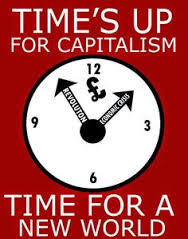If capitalism is presently incapable of solving the more pressing problems faced by humanity, we can well ponder what a difficult time ahead we face in a world in which we are increasingly at the mercy of the elements.
For many, environmental issues are new. As socialists, forever scrutinising the effects of the capitalist mode of production, we have been aware of them for generations. In fact, Engels commented:
“At every step we are reminded that we by no means rule over nature like a conqueror over a foreign people, like someone standing over nature – but that we, with flesh and blood and brain, belong to nature and exist in its midst, and that all our mastery of it consists in the fact that we have the advantage over all other creatures of being able to learn its laws and apply them correctly. We are gradually learning to get a clear view of the indirect, more remote social effects of our productive activity, and so are afforded the opportunity to control and regulate these effects well. This regulation, however, requires a complete revolution in our existing mode of production…in our whole contemporary social order” ( Dialectics of Nature, 1875).
In spite of all the evidence that suggests that deforestation, present production and transport methods are primarily responsible for the climatic warning – the disappearing polar ice caps, global flooding, rising sea levels, vegetation dieback, the loss of thousands of species of life, and that the speed and scale of global warming have no precedent – the world’s governments still insist these wasteful, though profit-generating methods must remain.
The problem is as always over the issue of loopholes which allows countries to minimise cutting back on carbon emissions. Instead of cutting their fossil fuel (carbon) emissions, they buy carbon credits from countries that are not likely to exceed their carbon emission quota, with countries paying for a project in a lesser developed country, with the aim of reducing carbon and counting it against their own emissions. This is already proving a lucrative business. Those companies can get excited about the profits to be made from trading in pollution credits – whilst the planet we inhabit faces environmental catastrophe from pollution – says much about the insanity of the system we live in and very much begs the question: are you with us or against us?
You name the dodge and the profit-greedy have thought of it. This includes feeding cattle, pigs and sheep new diets that help reduce the amount of methane they emit when they burp.
The perennial problem is that countries are reluctant to promote investment in more environmentally friendly methods of production and transport because their respective governments, being the executive arm of the capitalist class, prefer to bow with suppliant knee to powerful oil, coal, iron and steel lobbies, rather than openly acknowledge that we are ecologically fast approaching the point of no return. We can well expect the next round of talks to be another waste of time whilst providing us with further evidence that capitalism has long outlived its usefulness and that it is time to hand over control of the world to those who could best decide its future – a global socialist majority.
Since our Party’s founding, we have consistently reported the misery and sufferings our class has endured in the name of the profits derived from mineral wealth and its possession by an elite. We expect, for the foreseeable future, to carry on in this tradition until our class truly wakes up. Few make an attempt to set the problem in a wider social and economic context - for instance making that crucial link to the priority of profit before human need.
The solution remains the same. There is one world and we exist as one people in need of each other and with the same basic needs. There is far more that unites us than can ever divide us along cultural, nationalistic or religious lines.
Together we can create a civilisation worth living in, but before that happens we need the conscious cooperation of ordinary people across the world, united in one common cause – to create a world in which each person has free access to the benefits of civilisation, a world without borders or frontiers, social classes or leaders and a world in which production is at last freed.


No comments:
Post a Comment